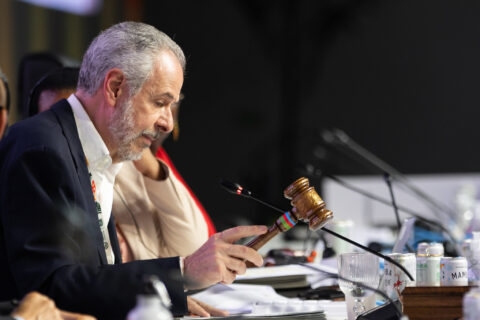Climate Change
The COP30 Mutirão agreement was just talk without truth
Yamina Saheb is CEO of the World Sufficiency Lab, an IPCC AR6 mitigation report author, lecturer and researcher at Sciences Po in Paris. Ana Díaz-Vidal is a PhD candidate at the Universitat de Barcelona and has previously worked on energy and climate issues at the OECD and REN21
COP30 was heralded by President Lula as the summit that would transform climate diplomacy from promises into real change. Yet without confronting fossil capital and forest destruction, it reduces climate diplomacy to a technocratic exercise in crisis management.
COP30’s Mutirão declaration fails to name the root causes of climate change. There is no acknowledgment of the global economic system and governance structures that drive fossil fuel demand and production. Instead, we get euphemisms: efforts, contributions, transitions.
This is talk without truth.
It is true that the Mutirão is not the only text that comes out of this COP, but it is a text that represents the negotiations that have occurred in the past two weeks, as well as the text that civil society and media will pay most attention to.
A close look at the COP30’s declaration’s legal verbs and phrases that come with them shows how climate diplomacy has become fluent in evasion. Verbs like recognizes, welcomes, and reaffirms dominate the text, paired with already established sets of words such as climate action, Nationally Determined Contributions, and implementing the Paris Agreement. These combinations sound official, even urgent, but they lack precision, and just repeat what was established back at COP21, ten years ago.
The most legally potent verbs, decides, requests, appear infrequently and are rarely paired with concrete terms like emissions reduction or financing. Instead, the declaration leans on soft verbs that signal recognition without responsibility. It is easier to acknowledge climate change than to commit to phasing out fossil fuels.
From the first draft, on the 18 November, to the last draft, on the 22nd, we see action verbs declining from 27 appearances to only 14, with decides, going from 20 to only eight instances.
This linguistic fog allows governments to claim alignment without changing course, keeps polluters at the table without being named, and leaves civil society deciphering documents that should be transparent by design.
A key imbalance is the small presence of mitigation, as if adaptation, especially for vulnerable communities already enduring climate impacts, was possible without drastic emission cuts. The Paris Agreement’s central promise was to keep warming below 1.5°C, a goal that demands rapid, binding commitments to reduce emissions.
The declaration is filled with hopeful language on action, adaptation and global cooperation. But it barely mentions mitigation, preferring to dwell on resilience and implementation. Yet while adaptation alone comes up 18 times, mitigation is mentioned only seven times and reductions five times, a telling measure of the shift in attention away from fossil fuel phase out.
Without mitigation, adaptation becomes mere survival in a world that keeps burning.
The declaration gestures toward international cooperation, but it is thin on climate justice. The need for a just transition is merely noted in paragraph 17. There is no binding commitment to loss and damage fund, no recognition of historical responsibility, and no structural support for communities already living through climate collapse. Justice, once again, is deferred.
The heatmap of COP30’s legal language is more than a visual, it is a warning. When climate declarations speak in circles, they fail the very people they claim to protect. If we want real action, we need real words. And we need them now.
COP30’s declaration is not just a missed opportunity, it is a dangerous precedent. If we want declarations that matter, we must demand language that tells the truth. Until then, COPs will remain a diplomatic theatre for climate action avoidance.
Future generations cannot afford another summit of euphemisms. It is time for civil society, youth movements, and frontline communities to be heard and to secure instruments of accountability, not shields for delay.
Only then will climate diplomacy move from talk without truth to action with justice.
The post The COP30 Mutirão agreement was just talk without truth appeared first on Climate Home News.
